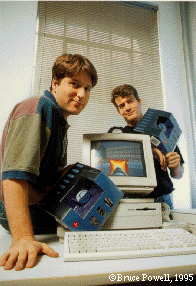 The University of Chicago Magazine June 1995
The University of Chicago Magazine June 1995

Astaire and Rogers. Siskel and Ebert. Batman and Robin. Now the University of Chicago has its own famous pair -- Alex Seropian, SB'91, and Jason Jones, '97. True, their names aren't household items, but their games certainly are -- computer games, that is.
Seropian and Jones develop and sell action-adventure, Macintosh-compatible software, including Marathon and Pathways into Darkness, a game named to Macworld magazine's 1993 Game Hall of Fame. Available in three languages, their software is sold in the U.S., Japan, and 13 other countries.
The two teamed up three years ago when Seropian, then a College fourth-year, saw market potential in a game that Jones and some friends were writing. Released in spring 1992, Minotaur, which began as a dorm-room diversion, marked the start of Seropian's and Jones's company, Bungie Software. Jones, now 23, became a part-time student and started writing their next game, Pathways, which Seropian describes as Bungie's "breakthrough" product.
Since its release two years ago, Pathways -- pitting players against monsters in a role-playing adventure game -- has generated seven-figure revenues. Seropian attributes the game's popularity to its realistic 3-D graphics, the same graphics found in virtual-reality applications. Al-though similar games were available for IBM compatibles, Pathways was the first of its kind for the Mac. "By the time Pathways came out," says Seropian, "Mac users were dying for a game like this."
The product's timing was also crucial for the young entrepreneurs. By then, Seropian explains, "We had met all the right people and learned what they wanted to hear...and where to spend the money to have an effective marketing program."
Pathway's profits allowed Bungie to move from Seropian's Hyde Park apartment to Pilsen -- and to hire other programmers and artists. Early in 1994, they began working on their latest game, Marathon, released this past December. "We've been unable to keep up with the demand," Seropian notes. He won't disclose exact figures, but tens of thousands of copies of Marathon have been sold to date.
Now employing eight people, Bungie has a work environment that encourages workers to be relaxed, yet driven. There are no dress codes or strict work hours. "We'd like to think no one is here under a tremendous pressure to perform -- people are here because they want to be."
Operating on new platforms, such as Windows or Sega, as well as creating new games, are what's in store for Bungie's future. In the meantime, the jeans-clad Seropian and his coworkers begin each workday on their network, battling to the death. Seropian notes that despite their success, one thing hasn't changed: "We're still just a bunch of young people who want to create cool things." -- Julekha Dash, AB'93